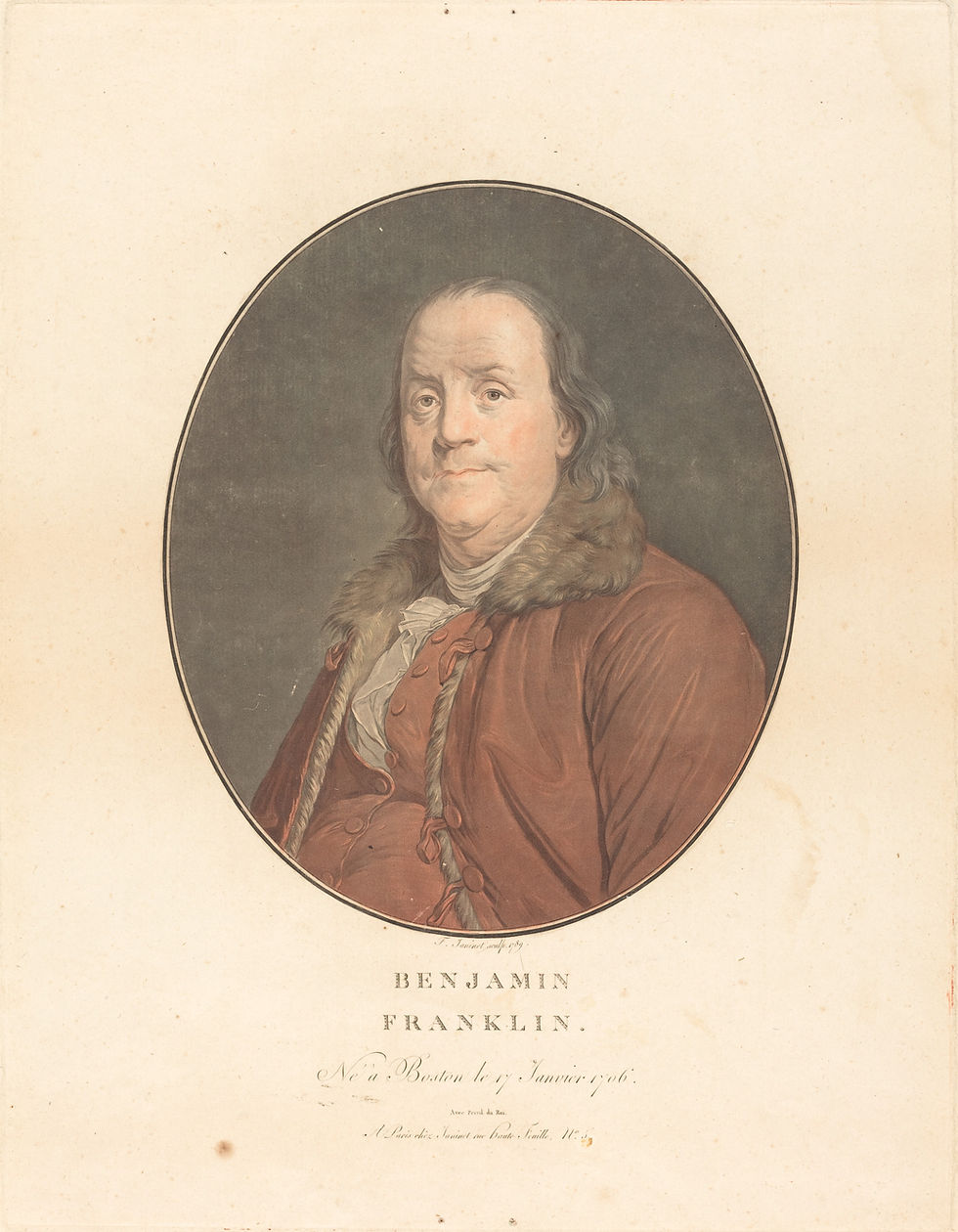Benjamin Franklin
- Haley Jensen
- Feb 23, 2021
- 3 min read
Updated: Apr 28, 2021
Benjamin Franklin (1706-1790) American politician, writer, Quaker, diplomat, philosopher, and socialite.
In 1721 Franklin started the New England Courant newspaper as an anti establishment media.
He continued to be a printer and newspaper writer until he retired from printing in 1747.
His most successful work came from writing his own almanac Poor Richard, which sold nearly ten thousand copies a year.
In 1752 Franklin began to experiment with electricity by tying a key to a kite and letting lightning strike it. He was now the most famous natural philosopher since Isaac Newton.
Ben Franklin was sent to London for the first time in 1757 by the Pennsylvania Assembly to represent the colonies interests against British proposed tax plans for the American colonies.
He returned to Britain between 1764 and 1775 to petition against the Stamp Act. Although Franklin was in London for political reasons, he spent his spare time with British elites. He was a member of many prestigious societies like the Royal Society of Arts and was a member of the Club of Honest Whigs.
Ben Franklin and Slavery
Benjamin Franklin's stance on slavery varied greatly over his lifetime. Franklin was a member of the Quakers, a religious group that advocated to end slavery.
Franklin himself was a slave owner and would advertise his own enslaved people in his newspaper the Pennsylvania Gazette.
In 1764 Franklin brought Peter and King with him to England, these men were enslaved by Franklin. King had run away from Franklin in 1766, suggesting that Franklin treated his slaves poorly.
In 1770 Franklin published "Conversation on Slavery" which stated that slavery in the America was like the treatment of an English soldier or sailor and included many racist tropes of black people. In his later life he embraced the abolition movement and wrote a petition that went to congress to abolish slavery and the slave trade in the US.
From Benjamin Franklin to Jonathan Williams, Sr., 7 July 1773
“Upon your Recommendation I went to see the black Poetess and offer’d her any Services I could do her. Before I left the House, I understood her Master was there and had sent her to me but did not come into the Room himself, and I thought was not pleased with the Visit. I should perhaps have enquired first for him; but I had heard nothing of him. And I have heard nothing since of her"
To Benjamin Franklin from Jonathan Williams, Sr., 17 October 1773
“The Black Poetess master and mistress prevaild on me to mention her in my Letter but as its turnd out I am Sorry I Did”

“A Conversation on Slavery, 26 January 1770,” Founders Online, National Archives, https://founders.archives.gov/documents/Franklin/01-17-02-0019. [Original source: The Papers of Benjamin Franklin, vol. 17, January 1 through December 31, 1770, ed. William B. Willcox. New Haven and London: Yale University Press, 1973, pp. 37–44.]
“From Benjamin Franklin to Jonathan Williams, Sr., 7 July 1773,” Founders Online, National Archives, https://founders.archives.gov/documents/Franklin/01-20-02-0158. [Original source: The Papers of Benjamin Franklin, vol. 20, January 1 through December 31, 1773, ed. William B. Willcox. New Haven and London: Yale University Press, 1976, pp. 291–292.]
“To Benjamin Franklin from Jonathan Williams, Sr., 17 October 1773,” Founders Online, National Archives, https://founders.archives.gov/documents/Franklin/01-20-02-0236. [Original source: The Papers of Benjamin Franklin, vol. 20, January 1 through December 31, 1773, ed. William B. Willcox. New Haven and London: Yale University Press, 1976, pp. 445–446.]”



Comments